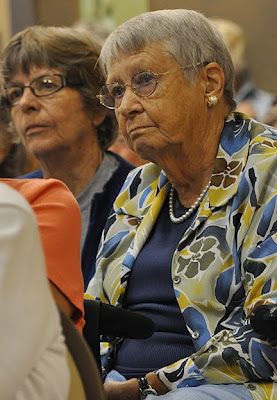 TORONTO, March 27, 2012 /Canada NewsWire/ - The province's so-called plan to keep spending in check will end up hurting vulnerable Ontarians the most, according to the nurses' association.
TORONTO, March 27, 2012 /Canada NewsWire/ - The province's so-called plan to keep spending in check will end up hurting vulnerable Ontarians the most, according to the nurses' association.
Members of the Registered Nurses' Association of Ontario (RNAO) say the "double whammy of freezing the minimum wage and social assistance rates isn't just bad social policy - it's bad health policy," says Chief Executive Officer Doris Grinspun. "Asking those who can least afford it to live with less is unconscionable," adding "nurses want to know what happened to Premier McGuinty's bold strategy to reduce poverty?"
RNAO says these moves and delaying the planned increases to the Ontario Child Benefit program will only hurt those who need help most. "The Premier seems to have forgotten his promise not to leave anyone behind," says Grinspun, adding that these cuts will result in higher health-care costs, as there is overwhelming evidence linking poverty with increased illness and premature death.
Nurses say expecting people to live on less than $20,000 per year stands in stark contrast to the salaries of hospital executives which the province says it will cap. "Rather than freezing salaries - ranging from $400,000 to $800,000 - the government should create a new normal where exorbitant compensation is prohibited," adds Grinspun.
Not all is grim in the budget, nurses say. David McNeil, RNAO's president, says "measures to improve same-day and next-day appointments as well as after-hours care with primary care providers, including nurse practitioners and physicians, are sound investments to prevent health complications and misuse of hospital ERs."
RNAO is also pleased that the McGuinty government ignored advice from economist Don Drummond to experiment with for-profit delivery, and instead is opting to expand the use of not-for-profit community-based clinics to perform routine procedures. McNeil says "the evidence clearly shows that not-for-profit clinics have better health outcomes and cost less."
Nurses understand the province wants to reduce the deficit. RNAO says the decision to delay a planned cut on corporate income taxes is welcome news, and the government should start a serious conversation on fair taxation to pay for public services.
Meanwhile, the best way to bring the deficit under control is not with deep cuts to social programs, but by improving integration between social programs and health services, as well as and within health itself. For example, RNAO points to existing duplication between Community Care Access Centres, hospital discharge co-ordinators and home care agencies. "This is unnecessary duplication that costs taxpayers money and could be better spent on direct care for patients at home. We have 4,300 primary care nurses who are eager and ready to take on the care co-ordination role," says Grinspun.
The Registered Nurses' Association of Ontario is the professional association representing registered nurses in Ontario. Since 1925, RNAO has advocated for healthy public policy, promoted excellence in nursing practice, increased nurses' contribution to shaping the health-care system, and influenced decisions that affect nurses and the public they serve. For more information about RNAO, visit our website at www.rnao.org. You can also check out our Facebook page at www.rnao.org/facebook and follow us on Twitter at www.twitter.com/rnao.
No comments:
Post a Comment